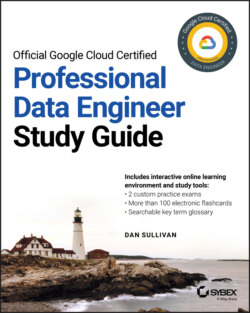Читать книгу Official Google Cloud Certified Professional Data Engineer Study Guide - Dan Sullivan - Страница 13
Introduction
ОглавлениеThe Google Cloud Certified Professional Data Engineer exam tests your ability to design, deploy, monitor, and adapt services and infrastructure for data-driven decision-making. The four primary areas of focus in this exam are as follows:
Designing data processing systems
Building and operationalizing data processing systems
Operationalizing machine learning models
Ensuring solution quality
Designing data processing systems involves selecting storage technologies, including relational, analytical, document, and wide-column databases, such as Cloud SQL, BigQuery, Cloud Firestore, and Cloud Bigtable, respectively. You will also be tested on designing pipelines using services such as Cloud Dataflow, Cloud Dataproc, Cloud Pub/Sub, and Cloud Composer. The exam will test your ability to design distributed systems that may include hybrid clouds, message brokers, middleware, and serverless functions. Expect to see questions on migrating data warehouses from on-premises infrastructure to the cloud.
The building and operationalizing data processing systems parts of the exam will test your ability to support storage systems, pipelines, and infrastructure in a production environment. This will include using managed services for storage as well as batch and stream processing. It will also cover common operations such as data ingestion, data cleansing, transformation, and integrating data with other sources. As a data engineer, you are expected to understand how to provision resources, monitor pipelines, and test distributed systems.
Machine learning is an increasingly important topic. This exam will test your knowledge of prebuilt machine learning models available in GCP as well as the ability to deploy machine learning pipelines with custom-built models. You can expect to see questions about machine learning service APIs and data ingestion, as well as training and evaluating models. The exam uses machine learning terminology, so it is important to understand the nomenclature, especially terms such as model, supervised and unsupervised learning, regression, classification, and evaluation metrics.
The fourth domain of knowledge covered in the exam is ensuring solution quality, which includes security, scalability, efficiency, and reliability. Expect questions on ensuring privacy with data loss prevention techniques, encryption, identity, and access management, as well ones about compliance with major regulations. The exam also tests a data engineer’s ability to monitor pipelines with Stackdriver, improve data models, and scale resources as needed. You may also encounter questions that assess your ability to design portable solutions and plan for future business requirements.
In your day-to-day experience with GCP, you may spend more time working on some data engineering tasks than others. This is expected. It does, however, mean that you should be aware of the exam topics about which you may be less familiar. Machine learning questions can be especially challenging to data engineers who work primarily on ingestion and storage systems. Similarly, those who spend a majority of their time developing machine learning models may need to invest more time studying schema modeling for NoSQL databases and designing fault-tolerant distributed systems.
